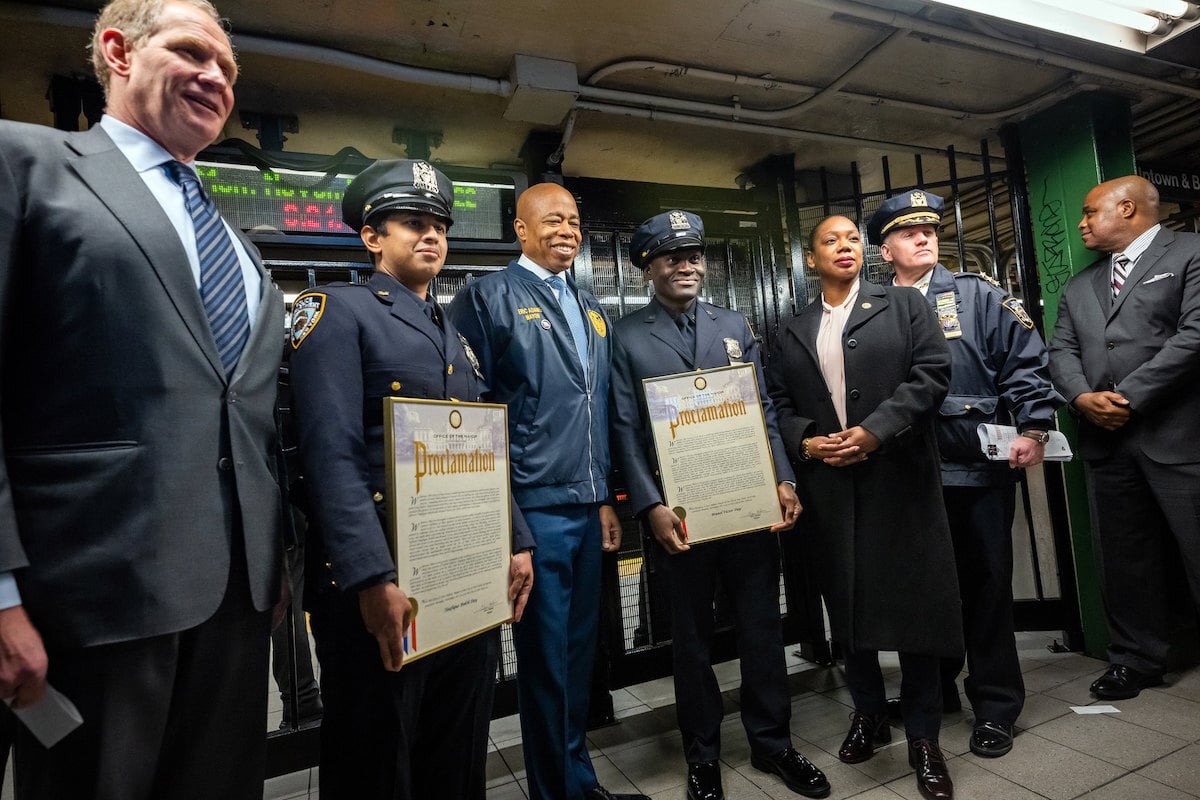- cross-posted to:
- [email protected]
- [email protected]
- cross-posted to:
- [email protected]
- [email protected]
Catching crimals is almost never profitable… but it’s still important and has positive externalities for discouraging future crime.
In this case though we’ve really got to ask how much we care about this. Some people are going to ride transit for free, we generally want those people to get a free ride rather than not having access to public transit.
It’s not about profitability. It’s about the extraordinary expense to discourage at best a minor misdemeanor that costs relatively very little in comparison. You could probably achieve the same effect paying one cop to monitor random stations and fine people as the do it. There are much more important things that cops could be doing that’s actually worth spending $150 million. Or you could just divert a fraction of that money to subsidize public transit.
That’s the point. Opportunity costs.
How many criminals, real criminals, could have been arrested and tried for that much money?
Or how many low income families could have gotten free/subsidized tickets?
How many cars could’ve been removed from the streets by simply letting everybody ride transit for free? That’s the biggest opportunity cost of them all.
Or even is it worth charging at all?
Well said. They could offer cheaper tickets and invest less in law enforcement involved in this. Less people will be criminalized that way.
I agree, but it feels weird to say:
Less people will be criminalized that way.
It’s the act that’s a crime, not the people.
Depends on the perspective. Imo it’s structural issues that can be solved if you rework the structure. Most people who don’t pay for their tickets don’t have the money, but would pay if it would be affordable.
In Germany you could see this happen when they pushed the 9€ ticket where you could travel all of Germany for the month… for 9€.
It was a huge success and I’m sure many people who didn’t buy tickets before did buy them then, simply because it was affordable, accessible and more chill.
Yes, but I don’t see what that has to do with my point
I misunderstood you, my bad
No worries lol it happens
Catching crimals is almost never profitable… but it’s still important and has positive externalities for discouraging future crime.
The “crime” of transit fare evasion has bigger positive externalities than discouraging it does.
This is why people are campaigning to remove the user-fees from Transit. That’s the proper way to do that.
Have you ever driven through a small town and seen a police car sitting right where the speed limit drops? Those tickets and the kangaroo mayor’s courts are the only reason some of those towns are still alive.
Yup! My grandmother actually lived right next to a town with a 20 mph speed limit on their center road that jumped up to 60 as soon as you left the town in either direction. It made the town an immense amount of money and was ridiculously predatory.
Public transit should be free
Free public transit is awesome
We have a similar problem with our transit system except that fares don’t really fund the system. Most of the money comes from a business tax.
Raise the tax something like 1.6% and they could eliminate fares all together…
If you’ve ever been on public transit, you know it’s not really just about the fare dodgers. It’s also about having someone, anyone, with authority regularly check up on things to crack down on the crazy shit happening that will discourage average riders from using the system — people blaring music, dance crews putting on impromptu shows on your train car, junkies overdosing in the corner, some guy making the train platform his permanent home, people pissing, shitting and vomiting in the wrong locations, influencers shooting their latest TikTok.
I’m all for free public transit, but I’d still want to see a staff presence on board telling people that don’t know how to behave in public to cut it the fuck out.
How the fuck are more cops playing Pokemon GO at the entrance to the subway gonna stop any of that? The trains are entirely unsecured. Once you get past the entrance you’re on fuckin Pandora from Borderlands.
In fact, cops give such few fucks that one guy was stabbed in front of a cop on the subway and took the cop’s inaction to the Supreme Court, who ruled that police have no duty to protect you. RadioLab covered it.
As for appropriation of funds, most stations are in a constant state of disrepair. The majority of them are not accessible, and only like two stations out of hundreds have safety rails on the platform. The trains also seem to catch on fire or derail every other day. There are plenty other things the MTA could do with $150M to actually make the subways safe. We need elevators more than we need cops.
cops playing Pokemon GO
False Dichotomy. Well done.
deleted by creator
Oh fuckoff copper
Fallacy fallacy. Well done.
Sounds like they should have spent 150M building solutions to these problems instead of dispersing these problems to other places…?
I don’t know what the staff could do about it these days.
Hey could you please turn down your music?
Music guy: “Fuck you” and turns it up.
And that’s that.
Any escalation beyond that becomes a civil or criminal issue.
This.
Also, the Broken Window theory.
This has been posted before, and it simply isn’t true.
The NYPD spent the money improving infrastructure and increasing the number of officers in the transit system. They caught farebeaters that added up to whatever the low number is, but that was hardly the only benefit.
I support defunding the police, and I’m sure there were better ways to spend the money, but making this about the economics of fare jumpers is disingenuous and undercuts the point.
Its a jobs program /s
It actually is though. My small town’s population peaked at around 40,000 back in 1970. Now we have about 17,000 but twice as many police officers on the force as back then. There is no need for it, and while our parks and schools fall into disrepair, the police department gets brand new toys to patrol around town every year
That sounds more like a racket than a jobs program.
They aren’t mutually exclusive
Asking the same question as the last time this article was posted:
Can anyone explain to me what the consequence for fare jumping is if they don’t do this enforcement? Can an economist explain what the expected value lost from additional jumping is without enforcement?
When I lived in NYC, I began getting monthly passes through work. I did this for 3 years, paying $100/mo or $1,200 a year. I was getting paid pennies to make a big company bigger, so I stopped paying and started jumping. I jumped for around 2 years on my commute and for any other transit. I had a pay per ride card if I was on a date or if I needed the bus transfer. I figured out which cars to hide in to avoid paying for LIRR or the Metro North tickets (hint: at rush hour, no one can walk through the cars).
I was caught one time, I jumped the turnstiles into the 6 train at 68th/Hunter College. Right in front of 3 cops looking for jumpers (of course they were trying to ticket poor college kids). Got a ticket for $85. Still less than my monthly card would have cost. I was gonna argue it with some lame ass excuse but ended up paying it just so I wouldn’t have to take a day off work. I still saved over $2300 by jumping.
So, not to say that this program is effective, but how many people were in a similar circumstance as me but decided not to jump because of deterrence policing?
Can anyone explain to me what the consequence for fare jumping is if they don’t do this enforcement? Can an economist explain what the expected value lost from additional jumping is without enforcement?
There is net societal gain from effectively reducing the price of transit, therefore encouraging its use, therefore reducing traffic congestion.
The transit agency’s books might not look quite as good because of lower fare revenue, but that’s okay because (a) as I explained above, the positive externalities outweigh the “losses,” and (b) government agencies aren’t supposed to make a profit anyway.
In theory I agree with you, but in practice free transit might actually deter use of public transit by those who could afford to drive. Los Angeles has done a good job building new public transit but since the pandemic and the elimination of fares, conditions on the trains, particularly the subways, have deteriorated significantly. Violent crime (assault, murder, rape) has jumped, often involving homeless.
Example: https://news.yahoo.com/l-riders-bail-metro-trains-120007450.html
The problem there isn’t free transit, though; the problem there is failing to house the homeless. Although I realize there are people (like you) who bring it up in good faith, I can’t help but think that the people who came up with the idea that charging for transit is good because it keeps homeless off the trains aren’t actually interested in improving either transit or homelessness.
Also, not having to enforce fare evasion frees up transit police to deter violent crime.
I can’t help but think that the people who came up with the idea that charging for transit is good because it keeps homeless off the trains aren’t actually interested in improving either transit or homelessness.
Congratulations your Mk II I-Don’t-Think-You-Assholes-Actually-Care Fire and Forget Torpedo scored a direct hit on your opponents Battleship HMS Austerity hitting the engine room and immediately (rhetorically) obliterating five whole subreddits of libertarians.

Thank you for your service
I roll for initiative against the commenter.
It’s super effective, the commenter is an ADHD type Pokémon!
The commenter will not get anything productive done for the rest of the day and will instead go on a tangent researching meerkats.
This hits a little too close to home!
Saving money is just an excuse: The cruelty is the point.
The point is to blindly enforce the law. That is cruel, and we need to rethink it, but there’s a degree of separation between that and being purposefully cruel.
This article, and the one by the Gothamist that its based on, make the claim but don’t show their work. It’s a statement of fact without any support. Interestingly the Gothamist article was also written and posted before 2023 was over.
I actually don’t doubt that it’s true, with the NYPD being understaffed by several thousand officers nearly anything extra they do is going to require serious amounts of overtime spending.
I really don’t get why they don’t ditch the turnstile system and do what a lot of European cities do. No turnstiles but ticket inspectors will randomly once in a blue moon surround you and require you show a valid ticket or give you a massive fine.
a massive fine
Actually, although that has changed some recently, the fines are really rather reasonable. Last time I was in Berlin I think it was like 30€. And in many cases can be avoided all together by buying a slightly more expensive ticket on the spot. A lot of people also just don’t mind and are of the opinion that those who don’t pay probably just don’t have the money for it.
I was mostly talking about the city where I live Which is massive in that its 50x the normal ticket amount.
The fine here is in the order of 300$…
This is also what the Muni does in San Francisco. Random ticket inspection on the light rail with a decent fine if you didn’t pay.
BART, the Bay Area subway system is spending a bunch to install new fare gates that you can’t push past which the news is reporting is going well, so that seems like another viable option.
In Singapore there had manned gates that were more like doors.
What? No they don’t. Unless “had” is the operative word there.
I’m not a mathematician, but I think they spent too much.
Maybe if they fined everyone they caught like a million dollars?
it doesn’t cost them anything to have an extra body on a train though. maybe the fares add up to that, but that’s not “losing money”
I mean you do have to spend money to make money… right?
You have to pay your retired buddies companies to install a bunch of hideous bullshit or you won’t get your kickbacks or board position once you get your pension.











